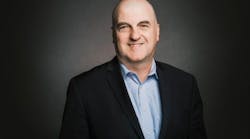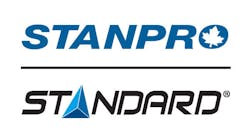In moves that, in many ways, have bewildered industry observers, Coral Gables, Florida-based Rexel, Inc., has continued along a rapid and seemingly relentless expansion of the global Rexel organization. The company, owned by Rexel S.A., Paris, France, had sales of $1.15 billion in 1996, and was ranked fifth in EW's latest "250 Biggest" listing. The company now has 196 locations in 25 states, and 3,000 employees.
In 1996, Rexel S.A. posted net sales of $4.5 billion, with 1,060 locations in 19 countries, and some 14,000 employees. Almost 60% of its sales came from global markets outside its home country in France. To learn about the kind of thinking that's behind the worldwide operations of Rexel Group, and to get a feel for what the company is all about, the best source is Alain Redheuil, Rexel S.A.'s chairman and chief executive officer, in the company's Paris headquarters.
"This is quite definitely an international organization, not a multi-national company," says Redheuil. "The distinction I am making here is that we habitually respect and respond to the cultural diversities of the markets in which we do business. We have to be German in Germany, Italian in Italy, and American in the States. This is achieved by fostering a strong entrepreneurial attitude among the companies that belong to the Rexel group worldwide, and also among the employees themselves. Mixing diverse cultures to form a unified group of entrepreneurs is perhaps our major accomplishment."
The essential philosophy of Rexel, according to Redheuil, is one of decentralization and autonomy, for the simple reason that knowing how to add value comes from knowing the local market.
"Business comes from the market," he observes, "so we must be pragmatic and practical. What we need to know in each of our locations is what the customer needs and wants, if we are to provide added value for both supplier and customer. There is no single solution."
At the same time, there is an internal need for coordination, and Redheuil refers to this as the Rexel "backbone." He sees the headquarters operation as a support system and nerve center for the group, but one he intends to keep lean. "We have less than 80 people to provide the administrative support for a $5 billion international organization, including finance, human resources, legal and taxes, marketing and logistics," he says. "I look upon the headquarters operation as I would any part of the business-if it did not add value, I would eliminate it. What this means is that the real power of this organization comes from each company in all the countries in which we operate."
In terms of marketing, sales, and logistics, the Rexel "backbone" provides a point of cross-referencing and synergy for the entire organization globally. Every two months, Rexel's international managers meet to share recent entrepreneurial developments and accomplishments. "Having access to different market cultures allows us to acquire a better sense of added value and how to share this knowledge," says Redheuil. "For example, in the U.S. we developed a very specific program to enhance our purchasing and inventory management. This has been adapted to European conditions and has proved quite successful. In one of our smaller companies in Germany, a credit management program was developed and shared throughout our organization.
"I cannot allow anyone within Rexel to say that this or that idea will never work for us. We first let everyone understand what the idea is and how it works, then we can make all the adaptations we want. By doing this we learn from each other and the business grows."
Aside from this cross-fertilization of management ideas, there are two other programs aimed at fostering exchange and internal growth. Two years ago, the organization inaugurated the "Rexel School." The concept was based on a model developed in another industry here in the U.S., and adapted to the electrical distribution industry.
When an employee is hired, he or she is taken out into the field for a few months to get a sense of how distribution actually works and to see how the company services its customers. After this initiation period, the new employee can attend the Rexel School.
The schooling period extends over two years, during which half of the student's time is devoted to study and half to actual work. The point that Redheuil stresses about the program is that it's a real-world learning process. "The goal of the program is to maximize the professionalism of every employee," he says. "We are not interested in teaching people theoretical approaches of a generic nature that would work anywhere there is a marketplace. We want to transfer knowledge in a very specific way by sharing the best practices we have developed within the various Rexel companies in terms of selling, marketing, logistics, and so on.
"Each student comes to the school with his own documented problems from the location and department in which he works. We then work with him to solve the problems he is having in the field with certain products and certain customers, so this is, in essence, a tailor-made training program.
"A given class may consist of 20 employees, but each one will be addressing a different customer base-MRO, construction, contractor, whatever-and in different locations with theirown particularities. All are involved with the same theme, but the approaches they develop will vary according to their locations' individual needs. "Then, when they go back into the field, they apply directly what they have learned, under the supervision of their managers."
Rexel Schools are in place now in France and Spain, and plans call for expanding the program to every country in which the organization operates.
While the Rexel School is dedicated to the needs of entry-level employees, the organization is also cognizant of the needs of veteran staffers, generating opportunities for their growth within the system. With an eye to the continuing demand for qualified managers in an expanding international organization, the company recently launched a worldwide program to recruit operational management and marketing people who will represent the "bench strength" Rexel will require as it continues to grow.
But Redheuil's objective is not to have them sitting on the bench waiting to be called into the game. "I don't think of these people as reserves," he says. "They are potential players who will definitely be involved in our future development. I want them directly in the business, learning by being completely involved in what we're doing. This way we will have the human resource pool we need to draw upon. This is a different vision from bringing on people when you need them."
But growth on a global scale brings with it a number of problems. In Europe, Rexel's greatest difficulty is that most of the national markets it serves have been flat for more than a year, or declining. A case in point is Germany, where the spiral has been downward for three years. Pricing is a problem in deflationary economies, and Rexel management is pulling out all the stops, looking for ways to grow business, gain market share and develop new niche markets.
"This is a dangerous time, but a time of opportunity as well," Redheuil says. "On the one hand, we must be quite energetic and creative in terms of sales and solutions; on the other hand, we must be very careful and very conscious of cost management."
Rexel's U.S. presence presents a different challenge-finding the right companies to acquire. "The growth philosophy of this company has nothing to do with good deals or short-term goals," states Redheuil. "It's a long-term vision and strategy. Our greatest problem in the U.S. is that we are not strong enough in some market areas, and we are not completely national. . .yet. But our growth will be based on professionalism and common sense. The only way we will continue to grow in the States is to bring on board very professionally managed companies. What kind of financial shape they are in when we buy them is not the critical issue. The point is that they must fit exactly with our basic strategy-good people, good management, and the capacity to generate good results."
Well-established in Europe and the U.S., Rexel looks cautiously at new, emerging markets such as those in the former Soviet bloc. But the attitude is one of circumspection, exploration and balancing the costs of risk and development against profit potential. Redheuil's comments about such ventures are laced with the terms "pragmatic" and "cautious." Some national markets, in Rexel's opinion, seem quite attractive, but are not really ready yet for the kind of electrical distribution practiced in the West. Such markets need to pass through a period of maturation before it would make any sense to introduce the concept of value-added expertise. Nevertheless, Rexel has invested time and capital in at least one of these countries-the Czech Republic. The company has two subsidiaries there, and four new branches were opened in 1996.
Redheuil's focus shifts back and forth from the macro to the micro in discussing the company's tactics and objectives. "We don't want to be the biggest electrical distributor in the world, we want to be the most professional," he says. "It would be absolutely devastating for me to find out that we were considered anything but professional in any market. And to prevent this from happening, we must pay attention to the smaller details.
"For example, the contractors in some of our locations in villages and towns are very professional with regard to product knowledge and service, but they are not experts at selling. They need support. So we have developed a series of catalogs for them to distribute to their customers. This is a selling tool with their name and the Rexel name on it. This helps them to grow their business. But it also reminds them that we want to help them develop and can supply them with very efficient and cost-effective tools."
Looking ahead, Redheuil has three major focal points relative to further expansion: building sales, improving financial results and providing growth for the worldwide employee base. The company grew 10% in 1996 and expected to surpass that rate in 1997. "By 2000 we will be a larger company globally," Redheuil. Wherever the needs of a local market offer an opportunity for expansion of our core business, that is where we will go.
"This company is all about development-but sound, measured development. And the major element in this development has to be professionalism at all levels, at every location. We must be consistent in this. In the simplest terms, we must continue to do what we say we will do."
Rexel's new chairman brings a common-sense perspective Alain Redheuil (pronounced red-OIL) was recruited by Rexel S.A. last year and took over as chairman and chief executive officer in October of 1996.
His background and his attitudes about corporate culture say a good deal about the continuing growth and international aspirations of Rexel S.A. He was born and raised in the central part of France, in the region called Auvergne. "The people of Auvergne have the same reputation as the Scots do," Redheuil observes. "They are very careful with money and are considered to be solid, modest people and you can believe they will do what they say. Perhaps that is why I prefer people who do not say too much, but act instead."
After completing his studies in economics and business, he left France for Canada where he would live and work for 15 years. He was a consultant first for the government of Quebec, then worked for a motor manufacturing company in Granby, near the U.S. border. At the age of 27, Redheuil was assigned to start from scratch a plant that would build motors, gear reducers, and generators for the North American market.
"I had the good fortune to have someone who had the confidence in me to entrust me with this opportunity when I was very young and in a foreign country," he says. Subsequently, the major portion of his career was spent with Michelin. He was first put in charge of one of their tire production plants in Nigeria. Next assignment was the direction of a plant in France, and then he was made vice president and general manager for Michelin Canada, based in Nova Scotia. Finally, he was named managing director of marketing and sales for Europe.
"When you live and work in other countries, you learn a lot," Redheuil reflects. "Respect for people and understanding them properly will change completely your attitude toward work and your actions. What upsets me is that too many experts are talking about fancy strategies and new techniques of human resources, but in the real terms of day-to-day business, they don't apply one damned element of their theories.
"The interplay of people and business is like a painting; you must use many colors and respect the strengths and subtleties of each. Then, perhaps at the end of the business day you will have a picture of your operations that is as true and correct as it can be in all its different elements."
In the last two years Rexel has added at least 80 locations and over 1,500 employees through eight acquisitions in four countries:
Cable & Connector Warehouse, Inc., Dallas, Texas: $39 million and 11 locations COAN, Sao Paulo, Brazil: $70 million in 1996 sales, 12 locations
Chemco Electric Supply, Inc., Tampa, Fla.: $23 million in 1996 sales, 3 locations
General Electric Co. PLC (of Great Britain) GEC's Industrial Group business units: 105 locations in Australia and 25 locations in New Zealand
Pacific Electrical Supply, Inc., San Leandro, Calif.: $93 million in 1996 sales, 10 locations
Selga, Armborstvagen, Sweden: $205 million in 1995 sales, 31 branches Southland Electrical Supply, Lexington, Ky.: $62 million in 1996 sales, 8 locations
Taylor Electric Supply, Inc.,Portland, Ore.: $49 million in 1996 sales 1 location
Utility Products Supply, Englewood, Co.: $29 million in 1995 sales, 4 locations (Subsequently sold as part of the 1997 divestiture of Rexel's utility business.)








